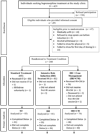Transitioning opioid-dependent patients from detoxification to long-term treatment: efficacy of intensive role induction
- PMID: 21277704
- PMCID: PMC3090541
- DOI: 10.1016/j.drugalcdep.2010.12.024
Transitioning opioid-dependent patients from detoxification to long-term treatment: efficacy of intensive role induction
Abstract
Despite findings that opioid detoxification serves little more than a palliative function, few patients who enter detoxification subsequently transition to long-term treatment. The current study evaluated intensive role induction (IRI), a strategy adapted from a single-session intervention previously shown to facilitate engagement of substance-dependent patients in drug-free treatment. IRI was delivered either alone or combined with case management (IRI+CM) to determine the capacity of each condition to enhance transition and engagement in long-term treatment of detoxification patients. Study participants were 240 individuals admitted to a 30-day buprenorphine detoxification delivered at a publicly funded outpatient drug treatment clinic. Following clinic intake, participants were randomly assigned to IRI, IRI+CM, or standard clinic treatment (ST). Outcomes were assessed in terms of adherence and satisfaction with the detoxification program, detoxification completion, and transition and retention in treatment following detoxification. Participants who received IRI and IRI+CM attended more counseling sessions during detoxification than those who received ST (both ps<.001). IRI, but not IRI+CM participants, were more likely to complete detoxification (p=.017), rated their counselors more favorably (p=.01), and were retained in long-term treatment for more days following detoxification (p=.005), than ST participants. The current study demonstrated that an easily administered psychosocial intervention can be effective for enhancing patient involvement in detoxification and for enabling their engagement in long-term treatment following detoxification.
Copyright © 2011 Elsevier Ireland Ltd. All rights reserved.
Conflict of interest statement
No conflicts of interest are reported.
Figures
References
-
- Amato L, Davoli M, Ferri M, Gowing L, Perucci CA. Effectiveness of interventions on opiate withdrawal treatment: an overview of systematic reviews. Drug Alcohol Depend. 2004;73:219–226. - PubMed
-
- Bell J, Caplehorn JM, McNeil DR. The effect of intake procedures on performance in methadone maintenance. Addiction. 1994;89:463–471. - PubMed
-
- Booth RE, Crowley TJ, Zhang Y. Substance abuse treatment entry, retention, and effectiveness: out-of-treatment opiate injection drug users. Drug Alcohol Depend. 1996;42:11–20. - PubMed
-
- Brown BS, Farrell G, Voskuhl T. Aftercare to Reduce Risk and Relapse of HIV Infection. 1999 Unpublished manual.
-
- Brown BS, O'Grady, Battjes RJ, Farrell E, Smith N, Nurco D. Effectiveness of a stand-alone aftercare program for drug-involved offenders. J. Subst. Abuse Treat. 2001;21:185–192. - PubMed
Publication types
MeSH terms
Substances
Grants and funding
LinkOut - more resources
Full Text Sources
Medical


